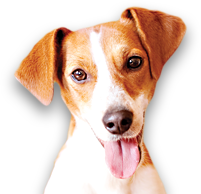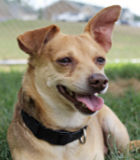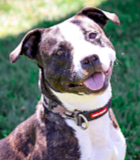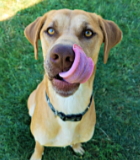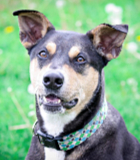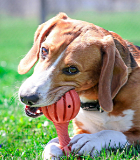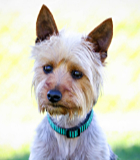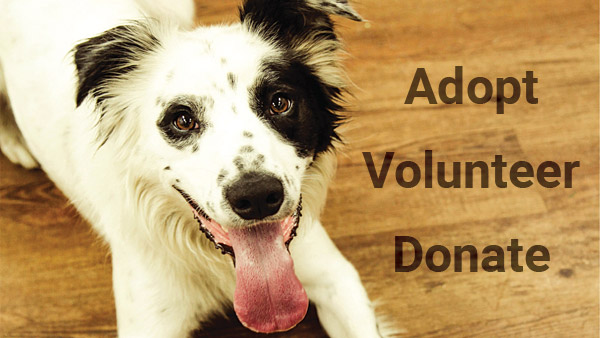Enriching Your Dog’s Life
- This topic has 0 replies, 1 voice, and was last updated 14 years, 10 months ago by
Mackenzie’s Admin.
-
AuthorPosts
-
June 17, 2010 at 5:30 pm #546
Mackenzie’s Admin
MemberBoredom and excess energy are two common reasons for behavior problems in dogs. This makes sense because they’re meant to lead active lives. Wild dogs spend about 80% of their waking hours hunting and scavenging for food. Domestic dogs have been helping and working alongside us for thousands of years, and most are bred for a specific purpose, such as hunting, farming or protection. For example, retrievers and pointers were bred to locate and fetch game and water birds. Scent hounds, like coonhounds and beagles, were bred to find rabbits, foxes and other small prey. Dogs like German shepherds, collies, cattle dogs and sheepdogs were bred to herd livestock.
Whether dogs were working for us or scavenging on their own, their survival once depended on lots of exercise and problem solving. But what about now?
Today’s Job Description: Couch Potato
Today that’s all changed. Now the most common job description for dogs is Couch Potato! While we’re away at work all day, they sleep. And when we come home, we serve them free food in a bowl—no effort required from them. They eat more calories than they can use. The result is dogs who are bored silly, often overweight and have too much energy. It’s a perfect recipe for behavior problems.What Does Your Dog Need?
It’s not necessary to quit your job, take up duck hunting or get yourself a bunch of sheep to keep your dog out of trouble. However, we encourage you to find ways to exercise her brain and body. Read on for some fun, practical ways to enrich your dog’s life, both when you’re around and when you’re not. You’ll find that these ideas go a long way toward keeping your dog happy and easier to live with. Try out a few and see what you and your dog enjoy most.Tips for Alone Time
Because we all lead busy lives, our dogs often end up spending a good portion of their day home alone. If you give your dog “jobs” to do when she’s by herself, she’ll be less likely to come up with her own ways to occupy her time, like unstuffing your couch, raiding the trash or chewing on your favorite pair of shoes. Plus, she’ll be less likely to enthusiastically tackle you when you come home, after she’s spent a day doing nothing but recharging her batteries!K-9 to 5: Will Work for Food
Food puzzle toys Food puzzle toys are sturdy containers, usually made of hard rubber or plastic, that hold food or treats inside but don’t give dogs easy access to the food. They usually have holes on each end or on the sides, and dogs must work by shaking, pawing, rolling, nibbling or licking the toy to get the food to come out. Food puzzle toys require time, patience and problem-solving—all skills that are good for your dog and will help her enjoy quiet time alone. Since our dogs’ wild counterparts spend much of their time scavenging for food, food puzzle toys offer a natural solution to pet-dog boredom. Puzzle toys also encourage chewing and licking, which can have a calming effect on dogs.Examples of food puzzle toys include KONG® Toy, the Buster® Cube, the Tricky Treat™ Ball, the Tug-a-Jug™, the Twist ‘n Treat™, the Atomic Treat Ball™ and the TreatStik®. You can find these toys online or at most major pet stores. Feed your dog at least one meal a day in a food puzzle toy to give her brain and jaws a great workout. You can also stuff these toys with your dog’s favorite treats or a little peanut butter, cottage cheese, cooked oatmeal or yogurt.
When you first introduce your dog to a food puzzle toy, make it really easy for her to empty it. She’s probably accustomed to getting her food served in a bowl, so she has some learning to do! Choose a toy with a large dispensing hole and make sure the goodies you put inside the toy are small enough to come out easily. As your dog becomes an expert, you can make it harder and harder for her to get food out of her toys. Use bigger pieces or food or, to provide an extra challenge, freeze the toys after stuffing them. You can also place the frozen toys inside a cardboard box or oatmeal tub so that your dog has to rip through the cardboard container to get to her meal. For recipes and detailed pointers on how to stuff a KONG® food puzzle toy, please see our article, How to Stuff a KONG® Toy.
Hunting for dinner You can make your dog hunt for her meals by hiding stuffed food puzzle toys or small piles of her kibble around your house. Hide one of your dog’s meals right before you leave her home alone, and she’ll have great fun hunting her chow while you’re away. To try a variation on this activity, scatter a couple handfuls of kibble around your yard so your dog can search for the pieces in the grass. Most dogs love this game!
Chew Time
Dogs of all ages need to chew. Both wild and domestic dogs spend hours chewing to keep their jaws strong and their teeth clean. They also chew for fun, for stimulation and to relieve anxiety. Whether you have a puppy or an adult dog, it’s important to provide a variety of appropriate and attractive chew toys, like Nylabones® and hard rubber toys, natural marrow bones, rawhide and pig ears.Although chewing behavior is normal, dogs sometimes chew on things we don’t want them to. Giving your dog plenty of her own toys and chewies will help prevent her from gnawing on your things. However, if she’s still confused and you need help teaching her what’s okay to chew and what isn’t, please see our article entitled Destructive Chewing.
Social Opportunities
Just like people, dogs are social animals, and many enjoy spending time with members of their own species. Off-leash play with other dogs serves multiple purposes. It can give your dog opportunities to practice her social skills with other dogs, wear her out mentally and tire her physically. If your dog enjoys romping with dog buddies, give her regular opportunities to do so. Try taking her to a local dog park or doggie daycare. If you have friends or family with dogs, you can also arrange “play dates” at your respective houses. For more information about these activities, please see our articles, Dog Parks, Daycare for Dogs and Choosing Playmates for Your Dog.Things to Do Together
In addition to fun activities when you’re not around, your dog also benefits from spending plenty of quality time with you. There are many fun and exciting things you and your dog can do together. Read on for some suggestions.Get Moving
Don’t underestimate the value of a good walk or jog with your dog. Taking at least one outing per day will help keep your dog physically fit and give her opportunities to explore the world. Follow different routes and visit new places whenever you can so that your dog can experience novel smells and sights.To learn about more ways to provide a great physical workout for your dog, please see our article Exercise for Dogs.
Games to Play
Learning how to play with your dog in ways that are enjoyable and safe for you both will greatly enhance your relationship. The games listed below will exercise your dog’s body and satisfy her deeply rooted instincts to search, chase, grab and tug.Tug-of-war Playing tug with your dog can provide a wonderful outlet for her natural canine urges to grab and pull on things with her mouth. You can also use this game to exercise your dog and teach her important lessons, such as how to listen to you when she’s excited. For tips on how to play and important rules to follow, please see our article, Teaching Your Dog to Play Tug-of-War.
Fetch Teaching your dog to play fetch is great for a number of reasons. It requires your dog to exert a lot of physical effort—but you don’t have to! You can also use the game of fetch to teach your dog useful skills, like how to drop things when you ask her to.
Show your dog a toy and then toss it a short distance. (If she doesn’t follow the toy, try a different one.)
Praise her as she follows the toy.
When she picks it up and starts to return to you, praise her. (If she doesn’t return to you, don’t chase her. Just encourage her or play with another toy yourself.)
When your dog reaches you, position your left hand under her mouth to catch the toy.
Say “Give” or “Drop it” and then put a delicious treat very close to her nose with your right hand.
When she drops the toy into your left hand, give her your treat and praise her!
When she’s good at fetching in the hallway, you can practice outdoors.
After many repetitions your dog will learn the “Drop it” cue. Then you can stop using the treat. When you give the cue and she drops the toy, reward her by throwing the toy again.
For additional tips and a more detailed description of how to introduce your dog to this game, please see our article Teaching Your Dog to Play Fetch.Find It Giving your dog a chance to use her powerful nose can really wear her out! It’s easy to teach your dog to find hidden treats. Just put her in another room, out of sight, while you hide a few treats. When you introduce the Find It game, start out by choosing hiding spots that allow your dog to find the “hidden” treats easily. Try placing treats behind the legs of furniture, partially in view. After you’ve hidden the treats, go get your dog and say “Find it!” right before letting her into the room. Encourage her to look around for the treats. (You might have to point them out the first few times you play the Find It game.) As your dog becomes better and better at finding the treats, you can hide them in more difficult places, like behind pillows or underneath objects.
You can also play Find It with your dog’s favorite toy. Follow the directions above, but hide the toy instead of treats. When your dog finds it, you can play a game of tug or fetch as a reward.
Hide-and-Seek This game is similar to Find It—but instead of teaching your dog to hunt her favorite treats or toys, you’ll train her to search for you! Like Find It, Hide-and-Seek will exercise your dog’s mind and give her an opportunity to use her amazing sense of smell. It can also help her learn to love coming when called. Please see our article Teaching Your Dog to Play Hide-and-Seek for more details.
Chase Dogs were born to chase! Try tying one of your dog’s favorite toys to the end of a sturdy rope. You can attach the other end of the rope to a stick or plastic PVC pipe. Then use the stick or pipe to drag the toy around on the ground or twirl it in the air around you so that your dog can chase it. Many dogs find this game exciting and will chase the fast-moving toy until they’re exhausted. Of course, you want to let your dog catch it at times! If you’d rather not make a toy on your own, you can purchase one, such as the DogFisher™ made by Bamboo or the Chase It® Pet Toy. You can also buy an inexpensive lunge whip from a horse tack or feed store and tie a ball or other toy to the end of the whip. Tennis balls you can buy on a rope are good for this—or put a squeaky toy in a sock and tie the sock to the end of the whip. Then twirl the whip in a big circle and let your dog chase it. Your dog can get a good workout in a relatively small space.
When playing outdoors with you, your dog may enjoy chasing a stream of water from a hose. Use a sprayer attachment for maximum enjoyment. Try spraying the ground a few feet away from your dog and then rapidly moving the stream of water away from her, along the ground. Many dogs can’t resist chasing and trying to bite the water. Another unique way to satisfy your dog’s desire to chase is to purchase a bubble-blowing toy made for dogs, such as the Fetch a Bubble Big Bubble Blaster or the Bubble Buddy™. These toys produce bubbles that taste like bacon, chicken, peanut butter or barbeque!
Round-Robin Recalls This is a fun obedience game you can play with the whole family. Have everyone spread out around your living room. Take turns calling your dog to you, and treating and happily praising her when she reaches you. Make her earn her entire dinner in a game of Round-Robin.
With family members at least 20 feet apart, have one person happily say your dog’s name and then give the cue “Come!”
If your dog hesitates, don’t say “Come” again (nagging just teaches dogs to ignore you) but encourage her with clapping, slapping your thighs or making high-pitched noises.
When your dog gets to you, gently grab her collar, say “Good girl!” and treat her.
So that she’s ready to focus on the next person when she’s done eating, look away from your dog, and put your hands and treats behind your back. Then it’s the next person’s turn to call.Whenever one person is calling your dog, the other(s) should remain quiet and boring (treats behind back and looking away) so your dog isn’t confused about whom to go to.
When your dog’s good at recalls in your living room, spread out further around the house, even where you can’t see each other.
When she’s a champ at that, take the game outside into your yard or a fenced area.
Sports and Other ActivitiesThese days there are all kinds of organized sports and activities that you can do with your dog, including flyball, agility, musical freestyle (dancing with your dog), lure coursing, competition Frisbee (disc dog), tracking, herding, weight pulling and carting. There’s something out there for everyone. You can learn more about these exciting activities online:
For flyball information: North American Flyball Association: http://www.flyball.org
For agility information: United States Dog Agility Association: http://www.usdaa.com
For freestyle information: Canine Freestyle Federation: http://www.canine-freestyle.org or the World Canine Freestyle Organization: http://www.worldcaninefreestyle.org
For lure coursing information: American Sighthound Field Association: http://www.asfa.org/coursing.htm or American Kennel Club: http://www.akc.org/events/lure_coursing
For Frisbee/disc dog information: The International Disc Dog Handlers Association: http://www.iddha.com
For tracking information: American Kennel Club: http://www.akc.org/events/tracking
For herding information: The American Herding Breed Association: http://www.ahba-herding.org or American Kennel Club: http://www.akc.org/events/herding
For go-to-ground earthdog trials for dachshunds and small terriers: http://www.akc.org/events/earthdog/
For weight pulling information: International Weight Pulling Association: http://www.iwpa.net
TrainingEnroll in a reward-based training class to increase your dog’s mental activity, enhance the bond between you and your dog, and help her understand your expectations of her. Contact a CPDT (Certified Professional Dog Trainer) for group or private classes that can give you and your dog lots of great skills to learn and games to play together. Please see our Finding Professional Help article to locate a CPDT in your area. There are many kinds of training to investigate, such as basic obedience training, clicker training and trick training. To learn more, please see our articles, Training Your Dog and Clicker Training Your Pet.
No Free Lunch When you and your dog have learned some new training skills, you can start a No Free Lunch program. Here’s how it works. You control all the valuable resources in your dog’s life, such as food, water, affection, toys, walks, petting and playtime. Instead of giving these things for free, ask your dog to work for them! The work will exercise her brain and help her become more obedient. Just give your dog what she needs and wants after she does something you ask her to do. For example, if your dog wants to go on a walk, ask her to sit before you clip on her leash and open the door. If your dog wants dinner, ask her to sit-stay while you put down her bowl. If your dog wants to play a game of tug, ask her to lie down before you start the game. Your dog will happily learn to work for everything she loves in life.
Short on Time?
It’s often difficult to work time with your dog into your hectic daily routine. But if you’ve got a busy schedule, you can find help. Consider the following time-saving ways to add some excitement to your dog’s life:Look into the possibility of taking your dog to a dog daycare at least once or twice a week.
If you live close enough to work, consider going home to spend your lunch break with your dog.If you can’t make it home during the day, hire a dog walker to take your dog out for a stroll instead.
If you have friends or family members who don’t work during the day, ask if they’d be willing to let your dog visit them while you’re at work.
-
AuthorPosts
- You must be logged in to reply to this topic.

